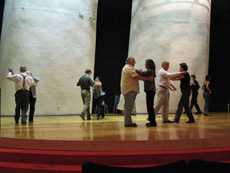Physics of Argentine tango

Members of the Argentine Tango class dance during a lesson on the stage of Ramsey Auditorium in Wilson Hall.
Every Wednesday night when the lights dim in Ramsey Auditorium the stage becomes a milonga, an Argentine dance salon.
"Physics and tango both require passion to become very good," said Pamela Noyes, of Fermilab's Procurement Department. "Physicists follow motion with their equations. Tango dancers follow each others motion with their senses.... If done well, both are extremely gratifying, perhaps one more to the mind and the other to the senses."
Noyes, who has taken tango classes for the last three years, grew tired of traveling weekdays to Chicago for classes. So, she asked her instructors to come to Fermilab to teach.
Two professional Argentine tango dancers from Chicago teach the beginning and intermediate classes, which began July 23 and have already attracted more than 50 students.
"I would talk about tango at work and people would say they would like to learn," Noyes said.
While ballroom and folk-dancing classes have been taught before at Kuhn Barn, this is the first Argentine tango class. Compared to other forms of tango, Argentine tango is a more intimate dance where the leader and follower interpret the music spontaneously and dance in an open or closed embrace.
"Tango is all about walking," Noyes said. "If you can walk with attitude, you can learn to dance tango."
The classes draw dance recruits from all over the laboratory, including graduate students, interns and the laboratory's director. Most students have no prior dance experience.
"I've always loved to tango," said Fermilab's Director Pier Oddone. "We don't get much of a chance to go dancing around here, so when I saw that Argentine tango classes were offered we jumped at the opportunity."
The on-going classes cost $15 per session. Space is limited. Contact Pamela Noyes for more information.
-- Jennifer L. Johnson
|